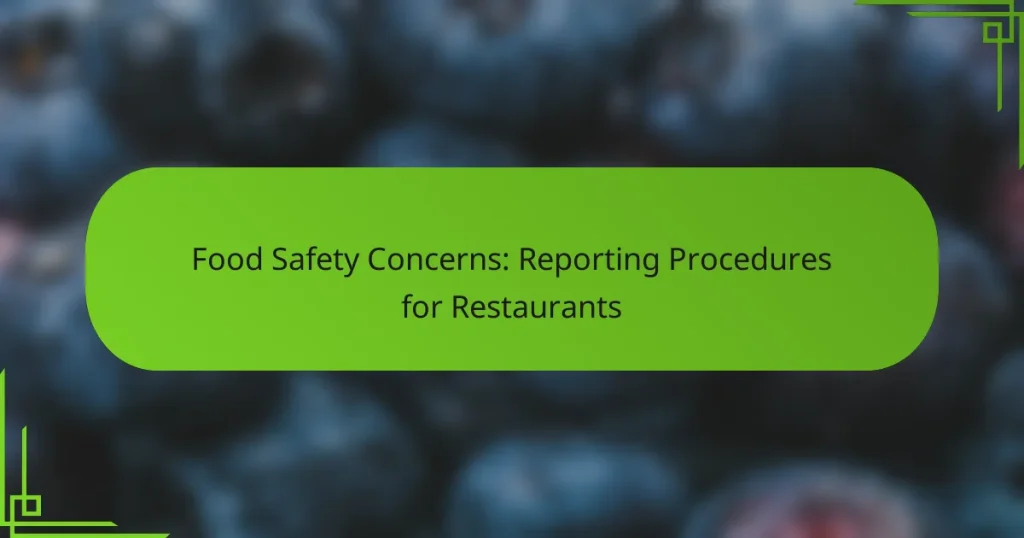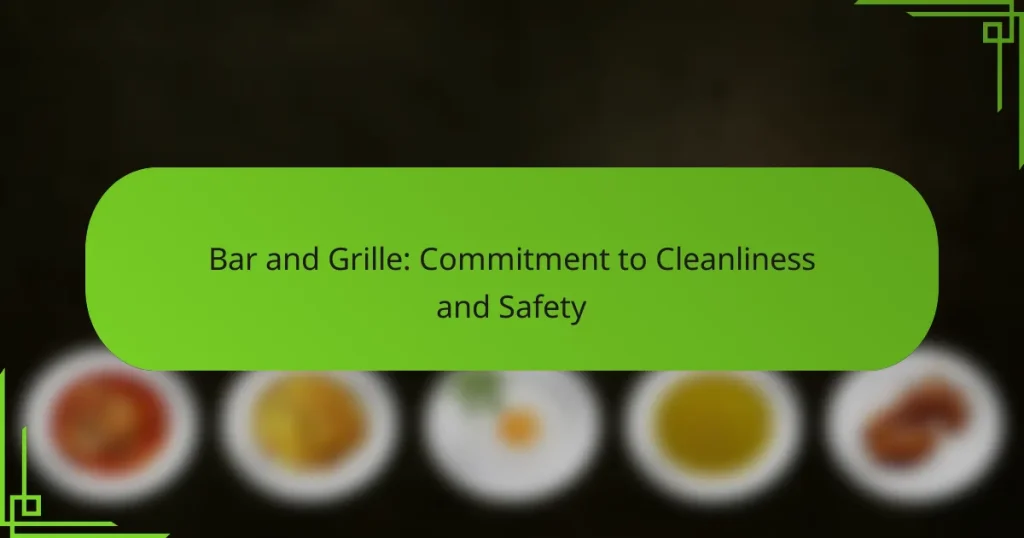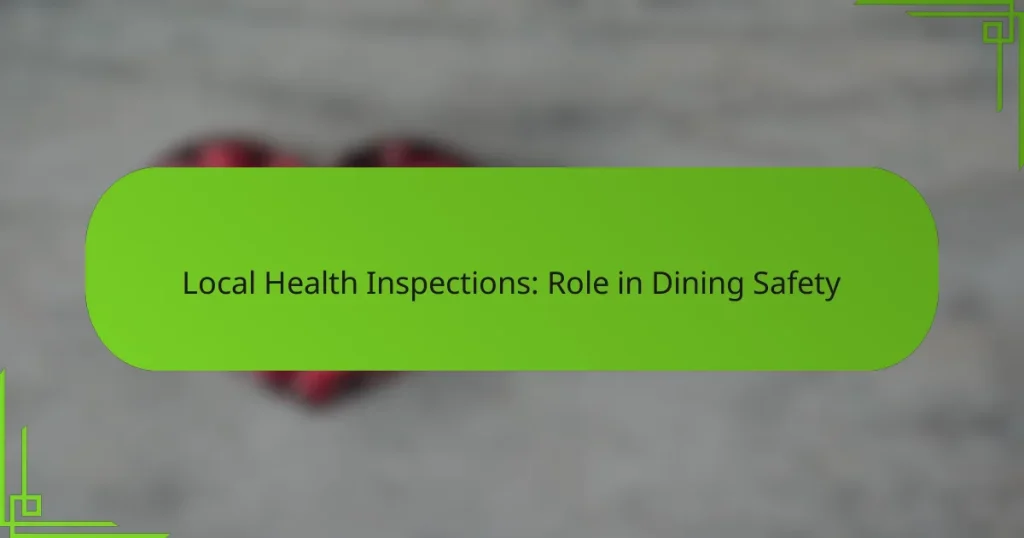In Los Angeles, bars and grilles must adhere to strict health and safety standards that prioritize food safety, employee health, and building safety. By implementing regular health inspections and comprehensive staff training, these establishments create a safe environment for both patrons and staff, reducing the risks of foodborne illnesses and workplace hazards.
Food Safety Concerns: Reporting Procedures for Restaurants
Bar and Grille: Commitment to Cleanliness and Safety
Food Safety Practices: Evaluation Criteria for Dining
Allergen Awareness: Essential Considerations in Restaurants
Local Health Inspections: Role in Dining Safety
COVID-19 Impact: Health and Safety Standards in Dining
What are the key health and safety standards for bars and grilles in Los Angeles?
The key health and safety standards for bars and grilles in Los Angeles focus on food safety, employee health, and building safety. Compliance with these standards ensures a safe environment for both patrons and staff, minimizing risks associated with foodborne illnesses and workplace hazards.
Food safety regulations
Food safety regulations in Los Angeles require bars and grilles to adhere to strict guidelines regarding food handling, storage, and preparation. Establishments must ensure that food is cooked to appropriate temperatures, and that cross-contamination is avoided by using separate utensils and surfaces for raw and cooked foods.
Regular inspections by the Los Angeles County Department of Public Health help enforce these regulations. Establishments should maintain proper food storage temperatures, typically below 40°F for cold items and above 140°F for hot items, to prevent bacterial growth.
Employee health guidelines
Employee health guidelines are crucial for maintaining a safe working environment in bars and grilles. Staff must be trained in hygiene practices, including regular handwashing and the use of gloves when handling food. Employees showing symptoms of illness, particularly gastrointestinal issues, should be encouraged to stay home to prevent the spread of infection.
Additionally, bars and grilles should implement a health screening process for employees, especially during flu season or outbreaks of contagious diseases. This proactive approach helps protect both staff and customers from potential health risks.
Building safety codes
Building safety codes in Los Angeles dictate the structural and operational safety of bars and grilles. These codes cover aspects such as fire safety, emergency exits, and accessibility for individuals with disabilities. Establishments must ensure that fire extinguishers are readily available and that exit routes are clearly marked and unobstructed.
Regular maintenance and inspections of electrical systems, plumbing, and ventilation are also required to comply with safety codes. Bars and grilles should keep documentation of these inspections to demonstrate compliance during health and safety audits.
How do bars and grilles ensure compliance with health standards?
Bars and grilles ensure compliance with health standards through a combination of regular health inspections and comprehensive staff training programs. These practices help maintain safe food handling, cleanliness, and overall customer safety.
Regular health inspections
Regular health inspections are a critical component of maintaining health standards in bars and grilles. Local health departments typically conduct these inspections at least once or twice a year, assessing various factors such as food storage, sanitation practices, and employee hygiene.
During an inspection, establishments may receive a score based on compliance with health regulations. A score below a certain threshold can lead to fines or even temporary closure until issues are resolved. It is essential for bars and grilles to address any violations promptly to avoid penalties and ensure customer safety.
Staff training programs
Staff training programs are vital for ensuring that employees understand and adhere to health standards. These programs often cover topics such as safe food handling, personal hygiene, and proper cleaning techniques. Regular training sessions help reinforce these practices and keep staff updated on any changes in regulations.
Bars and grilles should implement ongoing training, including refresher courses and new employee orientations. This commitment to education not only helps maintain compliance but also fosters a culture of safety and responsibility among staff, ultimately enhancing the customer experience.
What are the consequences of non-compliance with health standards?
Non-compliance with health standards in bars and grilles can lead to severe repercussions, including financial penalties and potential closure of the establishment. Adhering to these standards is crucial for ensuring the safety of patrons and staff, as well as maintaining the business’s reputation.
Fines and penalties
Fines for health code violations can vary significantly based on the severity of the infraction and local regulations. Minor violations may incur fines in the low hundreds of USD, while serious breaches can lead to penalties in the thousands. Repeated offenses can result in escalating fines, making it essential for establishments to prioritize compliance.
In addition to monetary fines, establishments may face additional costs related to required corrective actions, such as training staff or upgrading facilities. It is advisable to regularly review health standards and conduct self-audits to prevent violations and associated penalties.
Closure of establishment
In cases of severe non-compliance, health authorities may impose temporary or permanent closure of the establishment. This can occur after repeated violations or a single serious infraction that poses an immediate risk to public health. Closure can last from a few days to several months, depending on the situation and the establishment’s response to the issues.
To avoid closure, bars and grilles should maintain regular communication with health inspectors and promptly address any identified issues. Implementing a proactive health and safety plan can help mitigate risks and ensure ongoing compliance with health standards.
What are the best practices for maintaining hygiene in bars and grilles?
Maintaining hygiene in bars and grilles involves consistent cleaning, proper food handling, and effective storage techniques. These practices help prevent foodborne illnesses and ensure a safe dining environment for customers.
Daily cleaning protocols
Implementing daily cleaning protocols is essential for hygiene in bars and grilles. Staff should clean and sanitize surfaces, including countertops, tables, and equipment, at the start and end of each shift. High-touch areas, such as door handles and menus, require frequent attention throughout the day.
Establish a checklist for daily cleaning tasks to ensure nothing is overlooked. This checklist should include sweeping and mopping floors, emptying trash bins, and cleaning restrooms. Regular inspections can help maintain standards and identify areas needing improvement.
Proper food storage techniques
Proper food storage techniques are crucial for preventing contamination and spoilage. All food items should be stored at appropriate temperatures, with perishable goods kept below 5°C (41°F) and hot foods above 60°C (140°F). Use a thermometer to regularly check storage temperatures.
Label and date all food items to ensure freshness and facilitate rotation. Implement the FIFO (First In, First Out) method to use older stock first. Additionally, store raw meats separately from ready-to-eat foods to avoid cross-contamination.
How can bars and grilles implement effective safety training for staff?
Bars and grilles can implement effective safety training for staff by establishing a structured program that includes regular training sessions and certification programs. These initiatives ensure that employees are well-versed in health and safety protocols, reducing risks and enhancing customer safety.
Regular training sessions
Regular training sessions are essential for keeping staff updated on the latest health and safety practices. These sessions should occur at least quarterly to reinforce knowledge and address any new regulations or procedures that may arise.
During these sessions, staff can participate in hands-on training, role-playing scenarios, and discussions about real-life incidents. This interactive approach helps employees retain information and apply it effectively in their daily tasks.
Certification programs
Certification programs provide formal recognition of staff training in health and safety standards. Many organizations offer certifications that cover essential topics such as food safety, first aid, and emergency response.
Investing in certification not only enhances staff competence but also demonstrates a commitment to safety, which can improve customer trust. Consider programs that are recognized by local health authorities or industry associations to ensure credibility.
What role do local health departments play in bar and grille safety?
Local health departments are essential for ensuring bar and grille safety by enforcing health regulations and conducting regular inspections. They help maintain public health standards and provide guidance to food service establishments on best practices.
Conducting inspections
Local health departments perform routine inspections of bars and grilles to assess compliance with health and safety regulations. These inspections typically occur at least once or twice a year, depending on the establishment’s risk level and local laws.
During inspections, health officials check for proper food handling, sanitation practices, and employee hygiene. Establishments may receive a score or grade based on their compliance, which can influence customer perceptions and business reputation.
Providing resources and guidelines
Health departments offer valuable resources and guidelines to help bar and grille owners understand and implement safety standards. These resources often include training materials, food safety manuals, and access to workshops or seminars.
Additionally, local health departments may provide templates for safety plans, checklists for daily operations, and updates on changes to regulations. Utilizing these resources can significantly enhance an establishment’s ability to maintain compliance and ensure customer safety.
What are the emerging trends in health and safety for bars and grilles?
Emerging trends in health and safety for bars and grilles focus on sustainability and the integration of technology for monitoring compliance. These trends reflect a growing awareness of environmental impact and the need for efficient safety management systems.
Increased focus on sustainability
Bars and grilles are increasingly adopting sustainable practices to minimize their environmental footprint. This includes sourcing local ingredients, reducing waste, and implementing energy-efficient systems. For example, establishments may use biodegradable packaging and composting to manage waste effectively.
Additionally, many bars are exploring eco-friendly cleaning products and sustainable sourcing for beverages, such as organic wines and locally brewed beers. This not only appeals to environmentally conscious consumers but can also enhance the establishment’s reputation.
Use of technology for monitoring
Technology is playing a crucial role in enhancing health and safety standards in bars and grilles. Many establishments are now utilizing software and apps to monitor food safety, track inventory, and ensure compliance with health regulations. This can include temperature monitoring systems for food storage and real-time alerts for any deviations.
Moreover, digital checklists and automated reporting can streamline health inspections, making it easier for management to maintain standards. Investing in these technologies can lead to improved operational efficiency and a safer environment for both staff and patrons.






